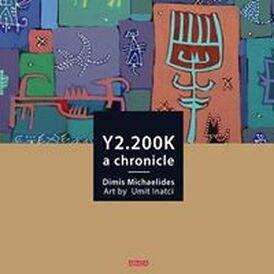|
By Melissa Hekkers The last time I spoke to Dimis Michaelides was almost three years ago. At the time, the multitalented business consultant was putting on a variety show entitled God, Sex, Revolution and You that attempted to blur the lines between social and sexual revolution through various artistic expressions. On that occasion, Michaelides used music, magic and theatre to unleash his creative whim to address the bilingual (Greek-English) community of the island. This time I am meeting him to look into another facet of Michaelides’ many personas through a literary work which tells “a story of the future of peace on earth as humans are threatened by highly intelligent aliens”.
Launched last week and entitled Y2.200K, “the book is a chronicle; an imagined future with major tensions between war and peace, science and superstition, nationalism and internationalism, democracy and dictatorship,” Michaelides says. All these notions are interplayed in the year Y2.050K when the Energia spacecraft begins its voyage to Proxima Centauri. As it travels, humanity progresses and regresses in leaps and bounds and alien threats loom in the background. Until it reaches the year Y2.200K… Throughout the chronicle there is an underlying drive to attain world peace that is obstructed by the achievements of man, whether this be the consequences of genetically modified food production, the increase of life expectancy, gene manipulation, space travel or artificial intelligence. “I have strong views on the themes that run through the book and I’m quite disappointed on what today looks like,” admits Michaelides. “Many politicians and their countries are regressing from international co-operation back to nativism. I’m always surprised and shocked by the hold of religion, and irrational belief in general, at times when the role of science in human progress should seem so glaringly evident,” he adds. It is perhaps this evidence that Michaelides uses in his chronicle to depict a future which is plausible and not too far from reality, a notion that is thought provoking and somewhat timely given current affairs. “I have no doubt that artificial intelligence and genetic engineering will bring immense benefits to humankind. They will also raise major issues as they completely transform ways of working and systems of employment, distribution of income and wealth. They will challenge sexual relations as well as the very nature of what it is to be human,” he asserts. “I’m unconvinced by the efficacy of organic farming. In my futuristic mind, I see a future where food is genetically manufactured and we don’t need to raise animals in order to slaughter them, or devastate eco-systems to grow crops. And yes, one day we shall be able to read people’s minds… these challenges can only be addressed and resolved collaboratively and certainly with a role for individual freedom and expression as well,” he adds. In the chronicle, Michaelides deals with the consequences of human progress through a fictional peace organisation he names Humanity International, a somewhat hopeful, global and collective drive that embodies the actions and visions of private and public organisations and places individuals as equal decision makers at its forefront. “Humans tend to have stronger affiliations to people who are close to them – family, traditions, beliefs etc. This might even somehow form a survival instinct though I doubt it is biologically embedded in our DNA. In any case, given the known potential of destruction of nuclear weapons today, such affiliations also threaten our survival. I optimistically speculate that we have reached a level of consciousness where we can actively engage in changing our thinking and living and even our DNA! “The future must be confronted globally and with each and every individual being a conscious actor in the process of progress. Science is value-free but people are not. They may choose to use science, technology and knowledge in different ways. We all know that the effects of climate change might be attenuated by global, collective action, but trying to convince the US President that this is so isn’t working these days,” comments Michaelides. To this end, Y2.200K attempts to answer the question: ‘Will the survival instinct beat politicians’ vanity and people’s propensity to self-destruct?’ Visually, the chronicle is accompanied by the artwork of Umit Inatci, a parallel dialogue that is maintained through abstract images. “I knew from the beginning that the book needed visuals but that it should not be a conventional ‘graphic novel’. His work is philosophical, full of symbols. He has an abstract aesthetic which balances spontaneity and structure. He has integrity as an artist and as a human being, having worked for many years as a soldier for peace in a united Cyprus… it’s easy to trust Umit when he takes on a challenge such as the one I proposed for Y2.200K: to design a book that is more than a story, a book that is a desirable object in itself,” Michaelides says. The book is available online through Armida Books www.armidabooks.com/book/y2-200k as well as from the Soloneio, Parga, and MAM bookshops in Nicosia, Kyriacos Bookshop in Limassol and Academic in Larnaca. Dimis Michaelides is an economist, marketer, financier, speaker, consultant and author on innovation, creativity and leadership. His first book The Art of Innovation – Integrating Creativity in Organisations has been hailed as “a Bible for 21st century CEOs”. Umit Inacti is a painter, poet, writer, filmmaker, academic and art critic whose painting and installations hang in major European contemporary art galleries.
0 Comments
Leave a Reply. |
LATEST POSTS
Archives
July 2021
|

